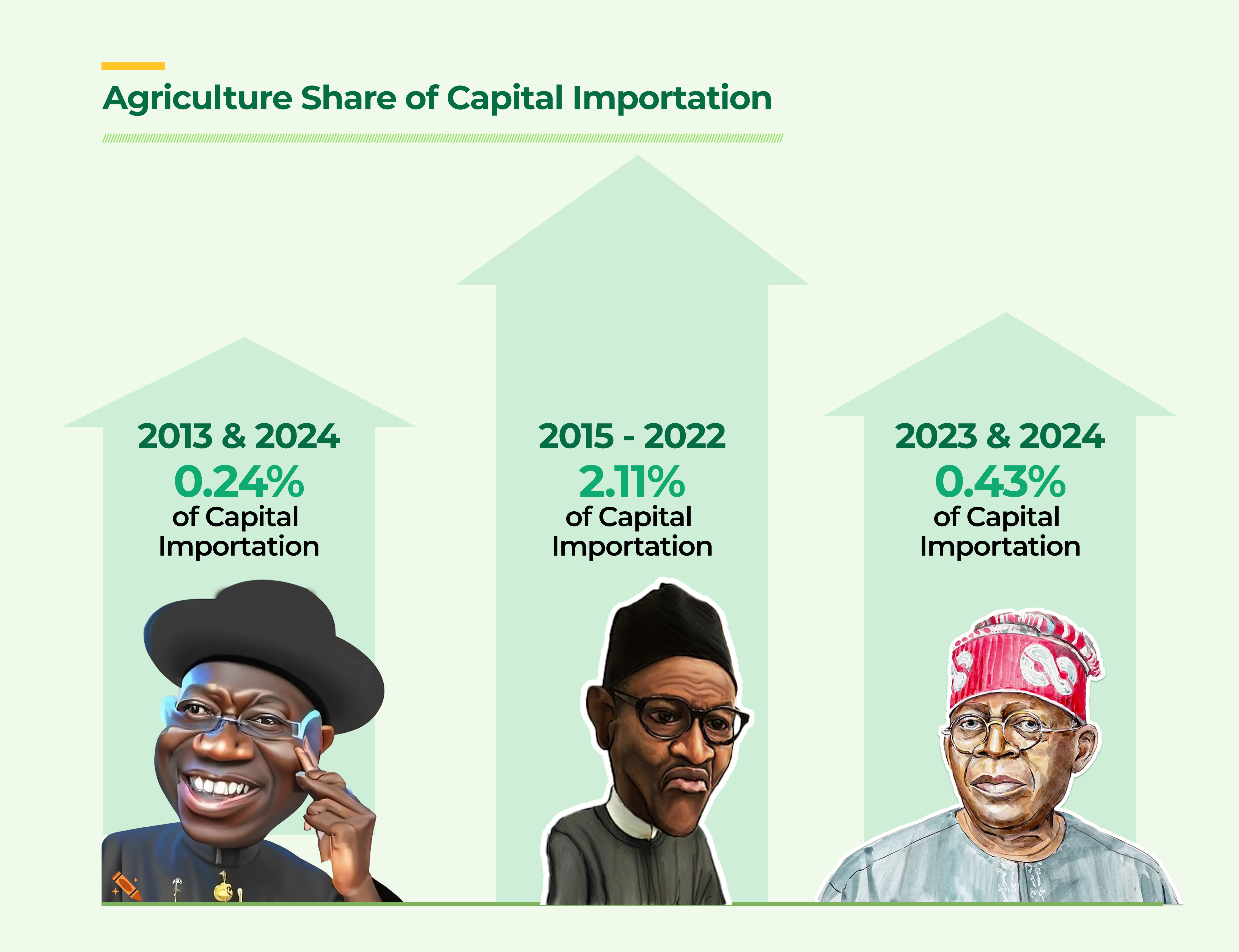Numbers from Nigeria’s statistics office reveal that former President Muhammadu Buhari attracted more foreign agricultural investments than his predecessors and successors, Goodluck Jonathan and Bola Tinubu.
The National Bureau of Statistics (NBS) Capital Importation report, which tracks the inflow of foreign financial resources into the country for investment purposes, shows that the Buhari administration secured a larger share of total foreign investments in agriculture compared to the immediate past and current governments.
An analysis of the figures reveals that under President Jonathan, the agriculture sector received less than 1% of total annual foreign capital inflows. The only year agriculture dipped below that benchmark during Buhari’s tenure was 2016. Notably, the sector reached a high of 5.4% in 2021.
In contrast, under President Tinubu, Nigeria’s agricultural sector has once again fallen to a foreign capital share of less than 1%, with a particularly dismal 0.04% recorded in the fourth quarter of 2024.
Available data shows that the Jonathan administration’s agricultural sector secured an average of 0.29% share of total foreign capital between 2013 and 2014. Buhari’s government had an average of 2.11% share between 2015 and 2022. Meanwhile, the Tinubu-led government averaged 0.43% foreign capital share in 2023 and 2024.

Despite facing criticism for raising debt levels, inflation, and foreign exchange volatility, the Buhari administration appears to have made measurable strides in attracting foreign capital to agriculture. However, some of its initiatives, such as the ₦1 trillion Anchor Borrowers’ Programme, have also drawn scrutiny for their implementation and outcomes.
Why Capital Importation into Agriculture Matters
When foreign capital flows into agriculture, it provides the funds needed to modernise the sector. Benefits include:
-
Access to improved seeds, fertilisers, and agrochemicals
-
Adoption of mechanised tools and irrigation systems
-
Investment in climate-smart and resilient agriculture
These improvements can lead to higher yields per hectare, reduced dependence on rainfall, and more efficient farming practices.
The Missing Link: Why Food Prices Still Rose
Curiously, despite a higher share of foreign investment in agriculture under Buhari, Nigeria witnessed an unprecedented surge in food inflation during his administration. This suggests that foreign capital alone, if not strategically deployed, does not guarantee food security.
The capital inflows did not translate into year-round food availability or price stability, due to key structural gaps.
Smarter Ways to Invest Agricultural Capital
To improve food security and maximise the impact of foreign capital, future investments should prioritise:
1. Agro-Processing Industries
Funds should support the development of processing facilities for products like rice, tomatoes, fruits, and vegetables. This will reduce post-harvest losses, extend shelf life, and create value-added goods for both domestic and export markets.
2. Modern Storage Infrastructure
Investments should go into:
-
Cold storage chains
-
Climate-controlled warehouses
-
Rural storage silos
These reduce spoilage, especially during glut seasons.
3. Efficient Distribution Networks
Capital should also improve transport and logistics systems to ensure food moves swiftly from farms to markets, especially in underserved areas. This helps stabilise prices and reduce artificial scarcity.
Conclusion
While the Buhari administration outperformed others in attracting foreign capital to agriculture, its failure to convert that investment into tangible food security gains highlights a deeper issue: capital must be strategically deployed.
Attracting foreign funds is only half the battle; ensuring they are spent on the right infrastructure, processing, storage, and logistics is essential for Nigeria to reduce food waste, stabilise prices, and feed its growing population.



